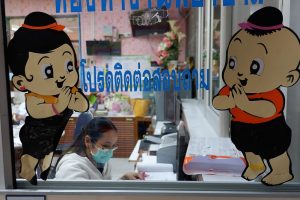The COVID Performance Index released by Sydney’s Lowy Institute earlier this year ranked Thailand among the top five countries in terms of its responses to the pandemic. However, things have gone downhill since the outbreak of the U.K. variant at Bangkok’s flashy Thonglor district at the end of March.
Since the Songkran holiday in mid-April, new daily cases have surpassed 1,000, and then, from April 23, exceeded 2,000. As of April 28, the total infections sit at 61,699 cases with 178 deaths. These figures are still relatively low compared to many other countries. However, Thailand’s affordable and accessible health care system is straining under the pressure, in large part because of a national policy of hospitalizing all COVID-19 patients including asymptomatic patients.
Visiting the hospital in Thailand is generally easy. There is no need to make an appointment weeks in advance. But now many cannot get access to hospital beds. ICU beds at private hospitals have been fully occupied and it has become increasingly difficult to get a spot at field hospitals. There is a story circulating online that three infected elderly sisters had been left stranded at home without assistance and one sister tragically died. Netizens have started comparing this case to the treatment of infected celebrities, asking why it is so easy for the latter to gain access to hospital beds when they need them. Defenders argue that the answer is straightforward, that celebrities pay for premium health insurance. This in turn has generated a heated online debate over class privilege and the widening gap between rich and poor.
Many patients do not disclose the full details of their contacts. Khon Kaen Hospital in northeast Thailand, for instance, was forced to put 105 medical personnel under quarantine after some patients allegedly covered up their travel history. This, together with the lack of suitable and sufficient PPE, is sparking fear of medical staff shortage.
The government of Prime Minister Prayut Chan-o-cha has been widely criticized for being non-communicative, slow, and ineffective in its response to the current COVID-19 outbreak. Prayut’s televised speech on April 16, and another on April 23, were disappointing to many. In his first speech, Prayut focused on attacking his critics and political opponents. The second speech was more informative, with talk of the procurement of vaccines, management of hospital beds, and the government’s 380 billion baht ($12.1 billion) budget for economic recovery. Still, much of the public sees Prayut’s promises as nothing more than empty words. Prayut has been further criticized for violating mask rules. Bangkok authorities recently made mask-wearing mandatory – even in a vehicle with two passengers – and the prime minister was among the first fined for not wearing a mask while attending a government meeting.
Fearing the negative impacts of the lockdown on Thailand’s already fragile economy, the government has opted for a “no national lockdown, no national curfew” solution, focusing instead on enhancing COVID-19 screening measures. Without concrete instructions from the central government, provincial authorities have imposed varying levels of restrictive measures.
The two vaccines distributed in Thailand so far have been China’s Sinovac and AstraZeneca. Given AstraZeneca’s blood clot risk and the concern over the effectiveness of Sinovac, the public demands a more diverse range of alternatives. The private sector in Phuket, Thailand’s renowned tourist island, has been trying to obtain alternative vaccines without waiting for a government rollout, highlighting further the government’s incompetence.
In a similar fashion, the Thai Chamber of Commerce together with CEOs from 40 leading Thai companies recently held an online conference to come up with ways the private sector can assist the government to speed up national vaccination rates. The CEOs noted that at that stage only 0.4 percent of the population had been vaccinated, which is too slow for a country that aims to reopen its borders. The conference noted that “at least 70 percent of the population in Bangkok must be vaccinated” in order for this to happen. Strikingly, the CP Group and SCG, two large conglomerates that are widely seen as supportive of the Prayut government, were among the participants.
The Prayut government has since announced that Pfizer and Russia’s Sputnik V are coming to Thailand. These purchases are most likely the result of quiet, behind-the-scenes negotiation. Ironically, just two days before Prayut’s announcement, the exiled former Prime Minister Thaksin Shinawatra offered to “personally talk to President Putin” to procure Sputnik V for Thailand. Naturally, Thaksin and the CARE Group – a newly formed political group including many of those who advised Thaksin when he was in power – is now getting more spotlight. Even armed with these new vaccines, the Thai government will need to move quickly to prevent the current outbreak from escalating, further undermining its already shaky legitimacy.

































